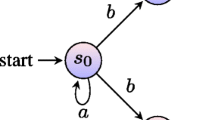Abstract
This paper introduces the notion of well-structured language. A well-structured language can be defined by a labelled well-structured transition system, equipped with an upward-closed set of accepting states. That peculiar class of transition systems has been extensively studied in the field of computer-aided verification, where it has direct an important applications. Petri nets, and their monotonic extensions (like Petri nets with non-blocking arcs or Petri nets with transfer arcs), for instance, are special subclasses of well-structured transition systems. We show that the class of well-structured languages enjoy several important closure properties. We propose several pumping lemmata that are applicable respectively to the whole class of well-structured languages and to the classes of languages recognized by Petri nets or Petri nets with non-blocking arcs. These pumping lemmata allow us to characterize the limits in the expressiveness of these classes of language. Furthermore, we exploit the pumping lemmata to strictly separate the expressive power of Petri nets, Petri nets with non-blocking arcs and Petri nets with transfer arcs.
Similar content being viewed by others
References
Abdulla, P.A., Cerans, K., Jonsson, B., Tsay, Y.-K.: General decidability theorems for infinite-state systems. In: Proceedings of the 11th Annual Symposium on Logic in Computer Science (LICS’96),pp. 313–321. IEEE Computer Society Press (1996)
Abdulla, P.A., Bouajjani, A., Jonsson, B.: On-the-fly analysis of systems with unbounded, lossy FIFO channels. In: Proceedings of the 10th International Conference on Computer Aided Verification (CAV’98), vol. 1427 of LNCS, pp. 305–318. Springer, Heidelberg (1998)
Abdulla, P., Annichini, A., Bouajjani, A.: Symbolic verification of lossy channel systems: application to the bounded retransmission protocol. In: Proceedings 5th International Conference on Tools and Algorithms for the Construction and Analysis of Systems (TACAS’99), number 1579 in LNCS,pp. 208–222. Springer, Heidelberg (1999)
Ciardo, G.: Petri nets with marking-dependent arc multiplicity: properties and analysis. In: Proceedings of the 15th International Conference on Applications and Theory of Petri Nets (ICATPN 94), vol. 815 of LNCS, pp. 179–198. Springer, Heidelberg (1994)
Delzanno, G.: Automatic verification of parameterized cache coherence protocols. In: Proceedings of the 12th International Conference on Computer Aided Verification (CAV 2000), vol. 1855 of LNCS, pp. 53–68. Springer, Heidelberg (2000)
Delzanno, G., Raskin, J.-F., Van Begin, L.: Towards the automated verification of multithreaded Java programs. In: Proceedings of the International Conference on Tools and Algorithms for Construction and Analysis of Systems (TACAS 2002), vol. 2280 of LNCS, pp. 173–187. Springer, Heidelberg (2002)
Dickson L.E. (1913) Finiteness of the odd perfect and primitive abundant numbers with a distinct prime factors. Am. J. Math. 35, 413–422
Emerson, E.A., Namjoshi, K.S.: On model checking for non-deterministic infinite-state systems. In: Proceedings of the 13th Annual Symposium on Logic in Computer Science (LICS ’98), PP. 70–80. IEEE Computer Society Press (1998)
Finkel, A., Geeraerts, G., Raskin, J.-F., Van Begin, L.: On the omega-language expressive power of extended Petri nets. In: Proceedings of EXPRESS’04, 11th International Workshop on Expressiveness in Concurrency, London, Great Britain, vol. 128(2) of Electronic Notes in Theoretical Computer Science, pp. 87–101. Elsevier, Amsterdam (2004)
Finkel A. and Schnoebelen P. (2001). Well-structured transition systems everywhere!. Theoret. Comput. Sci. 256(1-2): 63–92
German S.M. and Sistla A.P. (1992). Reasoning about systems with many processes. J. ACM 39(3): 675–735
Ginsburg S. (1975). Algebraic and automata-theoretic properties of formal languages. Elsevier, Amsterdam
Hopcroft J., Motwani R. and Ullman J. (2001). Introduction to automata theory, languages, and computation. Addison-Wesley, Reading
Jantzen M. (1986). Language theory of Petri nets. In: Brauer, W., Reisig, W. and Rozenberg, G. (eds) Proceedings of Advances in Petri Nets 1986, vol. 254 of LNCS., pp 397–412. Springer, Heidelberg
Minsky N.M. (1967). Finite and infinite machines. Prentice-Hall, Englewood Cliffs
Peterson J.L. (1981). Petri net theory and the modeling of systems. Prentice-Hall, Englewood Cliffs
Raskin, J.-F., Van Begin, L.: Petri nets with non-blocking arcs are difficult to analyse. In: Proceedings of the 5th International Workshop on Verification of Infinite-state Systems (INFINITY 2003), vol. 96(1) of ENTCS. Elsevier, Amsterdam (2003)
Salomaa A. (1973). Formal languages. Academic, New York
Salomaa A. (1985). Computation and automata, vol. 25 of Encyclopedia of Mathematics and its Applications. Cambridge University Press, Cambridge
Van Begin, L.: Efficient verification of counting abstractions for parametric systems. PhD thesis, Université Libre de Bruxelles, Belgium (2003)
Author information
Authors and Affiliations
Corresponding author
Additional information
Laurent Van Begin has been supported by a “First Europe” grant EPH3310300R0012 of the Walloon Region. This work has been partially supported by a FRFC grant number 2.4530.02 of the belgian National Fund for Scientific Research (FNRS).
Rights and permissions
About this article
Cite this article
Geeraerts, G., Raskin, JF. & Van Begin, L. Well-structured languages. Acta Informatica 44, 249–288 (2007). https://doi.org/10.1007/s00236-007-0050-3
Received:
Accepted:
Published:
Issue Date:
DOI: https://doi.org/10.1007/s00236-007-0050-3




